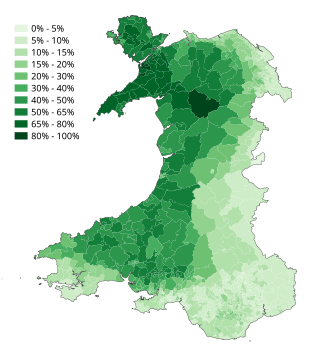| Welsh | |
|---|---|
| Cymraeg, y Gymraeg | |
| Pronunciation | [kəmˈraːiɡ] |
| Region | United Kingdom (Wales, England), Argentina (Chubut Province) |
| Ethnicity | Welsh |
| Speakers | |
Early forms | |
| Dialects | |
| Official status | |
Official language in | Wales (United Kingdom) |
Recognised minority language in | |
| Regulated by |
|
| Language codes | |
| ISO 639-1 | cy |
| ISO 639-2 | wel (B) cym (T) |
| ISO 639-3 | cym |
| Glottolog | wels1247 |
| ELP | Welsh |
| Linguasphere | 50-ABA |
 Welsh-speaking population in Wales according to the 2021 census | |
 Welsh is classified as Vulnerable by the UNESCO Atlas of the World's Languages in Danger (2010)[7] | |
| Part of a series on the |
| Culture of Wales |
|---|
 |
| People |
| Art |
Welsh (Cymraeg [kəmˈraːiɡ] or y Gymraeg [ə ɡəmˈraːiɡ]) is a Celtic language of the Brittonic subgroup that is native to the Welsh people. Welsh is spoken natively in Wales, by some in England, and in Y Wladfa (the Welsh colony in Chubut Province, Argentina).[8]
It is spoken by smaller numbers of people in Canada and the United States descended from Welsh immigrants, within their households (especially in Nova Scotia). Historically, it has also been known in English as "British",[9] "Cambrian",[10] "Cambric"[11] and "Cymric".[12]
The Welsh Language (Wales) Measure 2011 gave the Welsh language official status in Wales.[13] Welsh and English are de jure official languages of the Welsh Parliament, the Senedd,[14] with Welsh being the only de jure official language in any part of the United Kingdom, with English being merely de facto official.[15]
According to the 2021 census, the Welsh-speaking population of Wales aged three or older was 538,300 (17.8%) and nearly three quarters of the population in Wales said they had no Welsh language skills.[16] Other estimates suggest that 862,700 people (28.0%) aged three or older in Wales could speak Welsh in March 2024.[17] Almost half of all Welsh speakers consider themselves fluent, while 20 per cent are able to speak a fair amount.[18] 56 per cent of Welsh speakers speak the language daily, and 19 per cent speak the language weekly.[18]
The Welsh Government plans to increase the number of Welsh-language speakers to one million by 2050. Since 1980, the number of children attending Welsh-medium schools has increased, while the number going to Welsh bilingual and dual-medium schools has decreased.[19] Welsh is considered the least endangered Celtic language by UNESCO.[20]
- ^ Hywel Jones. "Estimation of the number of Welsh speakers in England" (PDF). calls.ac.uk.
- ^ Devine, Darren (30 March 2013). "Patagonia's Welsh settlement was 'cultural colonialism' says academic". Wales Online. Cardiff: Trinity Mirror. Retrieved 6 May 2017.
Now, though 50,000 Patagonians are thought to be of Welsh descent, the number of Welsh speakers is believed to be between only 1,500 and 5,000.
- ^ "Wales and Patagonia". Wales.com – The official gateway to Wales. Welsh Government. Archived from the original on 5 April 2018. Retrieved 22 May 2016.
Today the province of Chubut, where most Welsh immigrants settled, has a population of 550,000 people. Of these, some 50,000 can claim Welsh ancestry and 5,000 speak the Welsh language.
- ^ Prior, Neil (30 May 2015). "Patagonia 150 years on: A 'little Wales beyond Wales'". BBC News. Retrieved 30 July 2020.
- ^ "Population of immigrant mother tongue families, showing main languages comprising each family, Canada, 2011". Statistics Canada. Retrieved 21 August 2017.
- ^ "Cultural diversity: Census 2021". Australian Bureau of Statistics. 12 January 2022. Retrieved 8 October 2023.
- ^ "Atlas of the world's languages in danger". UNESCO Digital Library. p. 183. Retrieved 2 March 2023.
- ^ Edwards, Huw. "Why do they speak Welsh in South America?". BBC iWonder. Archived from the original on 9 July 2019. Retrieved 16 September 2017.
- ^ E.g. in the Act of Uniformity 1662 (13–14 Chas. II, c. 55) §27: "That the Book [of Common Prayer] hereunto annexed be truly and exactly translated into the British or Welsh tongue."
- ^ Nolan, Edward Henry (1859). Great Britain As It Is. London: John Lane & Co. p. 47. Retrieved 10 September 2018.
- ^ Jackson, John (1752). Chronological Antiquities. Vol. III. London: J Noon. p. 143.
- ^ Walter Thomas, Mrs D; Hughes, Edward (1879), The Cymric Language, Cardiff: D Duncan & Sons
- ^ "Welsh Language (Wales) Measure 2011". legislation.gov.uk. The National Archives. Retrieved 30 May 2016.
The Welsh language has official status in Wales.
- ^ "National Assembly for Wales (Official Languages) Act 2012". www.legislation.gov.uk. The National Archives. Retrieved 19 April 2018.
The official languages of the Assembly are English and Welsh.
- ^ Dunbar, R (2007). Diversity in addressing diversity: Canadian and British legislative approaches to linguistic minorities and their international legal context. In: Williams C (ed) Language and Governance. Cardiff: University of Wales Press. p. 104.
- ^ "Welsh language in Wales (Census 2021)". GOV.WALES. 6 December 2022. Retrieved 6 December 2022.
- ^ "Welsh language data from the Annual Population Survey: April 2023 to March 2024 [HTML] | GOV.WALES". www.gov.wales. 27 June 2024. Retrieved 25 July 2024.
- ^ a b "Welsh language use in Wales (initial findings): July 2019 to March 2020 (revised) | GOV.WALES". www.gov.wales. 17 February 2022. Retrieved 19 December 2023.
- ^ "Almost a quarter of children in Wales are taught only in Welsh, as the language experiences a revival". ITV News. 4 September 2017. Retrieved 1 June 2020.
- ^ Luain, Cathal Ó. "Unesco: Status of Celtic languages outlined by atlas". Agence Bretagne Presse (in French). Retrieved 25 May 2023.